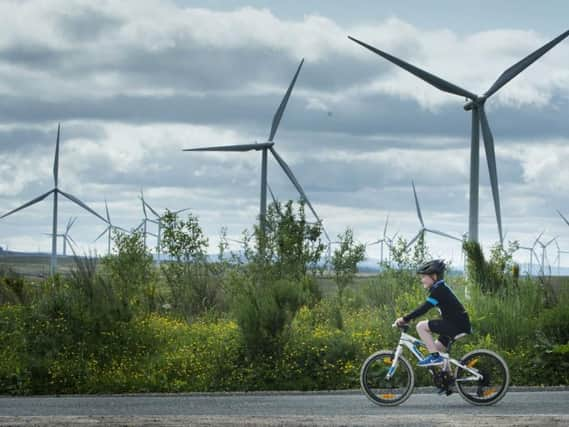Ofgem: UK progress in cutting greenhouse gas emissions has slowed


Greenhouse gas emissions fell last year by just 2.5 per cent, the smallest reduction since 2012, the regulator said - but added that the country still remained a global leader in cutting carbon, driven largely by the decarbonisation of electricity generation and an increase in renewable energy.
Renewables generated a record 33 per cent of electricity last year, the report said. Transport continued to be the largest single source of carbon emissions, although emissions fell slightly last year, partly down to an increase in the number of alternative fuel vehicles, which now account for two per cent of the licenced cars on the road in the UK.
Advertisement
Hide AdAdvertisement
Hide AdMeanwhile, the report also showed that competition continued to grow in the retail energy market. Market dominance of the six larger suppliers continued to weaken as they lost 1.3 million customers and medium and small suppliers now supply around 30 per cent of consumers. Switching rates increased to 20 per cent and hit a record high.
Small suppliers for the first time saw their market share fall to nine per cent of consumers, down from 10 per cent the year before, following a string of small utility firm collapses.
During this period, when shopping around for new deals, more consumers turned to price comparison websites, ‘auto-scanning’ notifications and auto-switching. Meanwhile, the number of consumers who said they had never switched fell to 29 per cent - down from 34 per cent in 2018.
Joe Perkins, chief economist at Ofgem, said: “Ofgem’s latest state of the market report shows the progress made so far to decarbonise the economy but much more needs to be done.
“We want the UK to remain a global leader in bringing down greenhouse gas emissions, and our major objective is to help the country rise to the challenge of cutting emissions to net zero by 2050 at the lowest possible price to consumers."
Protecting consumers
He added: “As well as protecting consumers in the future, our duty is also to protect those today. We will continue to enable competition and innovation which benefits consumers, whilst protecting those who need it, as we help build an energy market which works for all consumers.”
While overall, small and medium suppliers are taking market share away from the Big Sx, the report showed that the smallest energy firms are beginning to fall away. A large number of small utility companies have collapsed over the past year, forcing Ofgem to transfer their customers to another supplier "of last resort".
Peter Earl, head of energy comparethemarket.com, said: “One of the big takeaways from Ofgem’s flagship annual report is the electrified growth of the medium-sized suppliers, such as Octopus, OVO and Bulb, at the expense of the Big Six and smaller challenger brands. The Big Six saw their combined market share fall from 75 per cent to 70 per cent in the space of a year, losing a whopping 1.3 million customers as a group.
Advertisement
Hide AdAdvertisement
Hide Ad"If the Big Six continue to shed customers at this pace then by 2024 they will have less than 50 per cent market share – a scenario that would be a remarkable change in fortune for our largest energy players and demonstrate a fundamental transformation of the UK’s energy market."
Mark Todd, co-founder of energyhelpline, said: "Ofgem’s State of the Market report shows that record numbers of Brits are switching energy suppliers* but still there’s far too much suffering with millions overpaying and thousands dying in cold homes each year.
“Among the shocking statistics unveiled are that more than half of households remain on overpriced standard tariffs wasting £3 billion a year, millions live in fuel poverty and, tragically, 16,500 winter deaths last year were linked to cold homes. This is far too high a number for a wealthy developed economy."